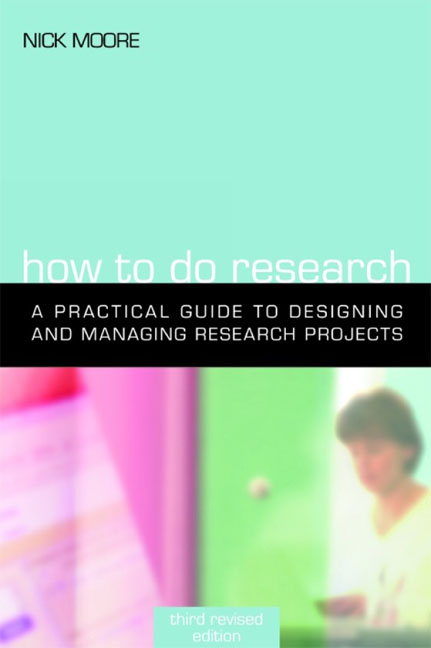Book contents
- Frontmatter
- Contents
- Acknowledgements
- Introduction: Types of research
- Part 1 The research process
- 1 Develop the research objectives
- 2 Design and plan the study
- 3 Write the proposal
- 4 Obtain financial support for the research
- 5 Manage the research
- 6 Draw conclusions and make recommendations
- 7 Write the report
- 8 Disseminate the results
- Part 2 Methods
- Appendix The market for information professionals: A proposal from the Policy Studies Institute
- Index
6 - Draw conclusions and make recommendations
from Part 1 - The research process
Published online by Cambridge University Press: 09 June 2018
- Frontmatter
- Contents
- Acknowledgements
- Introduction: Types of research
- Part 1 The research process
- 1 Develop the research objectives
- 2 Design and plan the study
- 3 Write the proposal
- 4 Obtain financial support for the research
- 5 Manage the research
- 6 Draw conclusions and make recommendations
- 7 Write the report
- 8 Disseminate the results
- Part 2 Methods
- Appendix The market for information professionals: A proposal from the Policy Studies Institute
- Index
Summary
This is the point everything has been leading up to. Having carried out the research and marshalled all the evidence, you are now faced with the problem of making sense of it all. Here you need to distinguish clearly between three different things: results, conclusions and recommendations.
Results are what you have found through the research. They are more than just the raw data that you have collected. They are the processed findings of the work – what you have been analysing and striving to understand. In total, the results form the picture that you have uncovered through your research. Results are neutral. They clearly depend on the nature of the questions asked but, given a particular set of questions, the results should not be contentious – there should be no debate about whether or not 63 per cent of respondents said ‘yes’ to question 16.
When you consider the results you can draw conclusions based on them. These are less neutral as you are putting your interpretation on the results and thus introducing a degree of subjectivity. Some research is simply descriptive – the final report merely presents the results. In most cases, though, you will want to interpret them, saying what they mean for you – drawing conclusions.
These conclusions might arise from a comparison between your results and the findings of other studies. They will, almost certainly, be developed with reference to the aim and objectives of the research. While there will be no debate over the results, the conclusions could well be contentious. Someone else might interpret the results differently, arriving at different conclusions. For this reason you need to support your conclusions with structured, logical reasoning.
Having drawn your conclusions you can then make recommendations. These should flow from your conclusions. They are suggestions about action that might be taken by people or organizations in the light of the conclusions that you have drawn from the results of the research. Like the conclusions, the recommendations may be open to debate. You may feel that, on the basis of your conclusions, the organization you have been studying should do this, that or the other.
- Type
- Chapter
- Information
- How to Do ResearchA practical guide to designing and managing research projects, pp. 72 - 79Publisher: FacetPrint publication year: 2006



